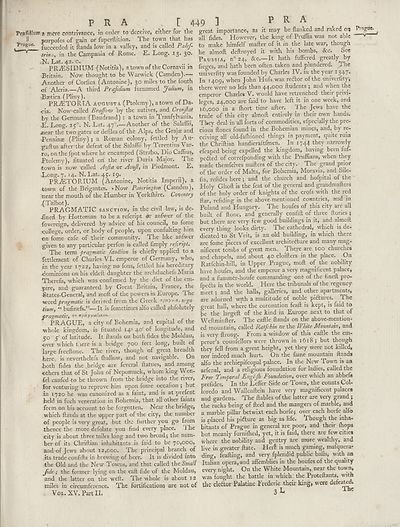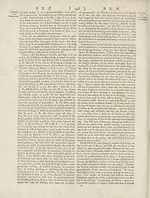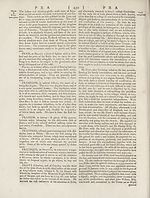Encyclopaedia Britannica > Volume 15, PLA-RAM
(495) Page 449
Download files
Complete book:
Individual page:
Thumbnail gallery: Grid view | List view

P R A , [ 4
Pf«ri^uini a mere contrivance, in order to deceive, either for the
H purpofes of gain or fuperllition. 1 he town that has
Lyrague' fucceeded it (lands low in a valley, and is called Palef-
trini, in the Campania of Rome. E. Long. 13. 30.
,N. Lat. 42. o.
PRiESIDIUM (Notitia), a town ef the Cornavii in
Britain. Now thought to be Warwick (Camden).—
Another of Corlica (Antonine), 30 miles to the fouth
of Aleria.—A third Prajidium furnamed Julium, in
Bsetica (Pliny).
PRETORIA Augusta (Ptolemy), atown of Da¬
cia. Now called Brajfnw by the natives, and Crovjiat
by the Germans (Baudrand) : a town in Tranfylvania.
•E. Long. 250. N. Lat. 47°.—Another of the Salafiii,
.ttear the two gates or defiles of the Alps, the Grajae and
•Penninse (Pliny) ; a Roman colony, fettled by Au-
guftus after the defeat of the Salaflii by Terentius Var-
ro, on the f{)ot where he encamped ( Strabo, Dio Caflius,
Ptolemy), lituated on the river Duria Major. The
•town is now called Aojia or Aouji^ in Piedmont. E.
-Long. 7. 14. N. Lat. 45. 19.
PRiETORIUM (Antonine, Notitia Imperii), a
town of the Brigantes. .Now Paterington (Camden),
near the mouth of the Humber in Yorkfhire. Coventry
(Talbot).
PRAGMATIC sanction, in the civil law, is de-
iined by Hottoman to be a refeript or anfwer of the
fovereign, delivered by advice of his council, to fome
college, order, or body of people, upon confulting him
•on fome cafe of their community. The like anfwer
given to any particular perfon is called fimply refeript.
The term pragmatic fanSion is chiefly applied to a
fettlement of Charles VI. emperor of Germany, who,
in the year 1722, having no fons, fettled his hereditary
dominions on his elded daughter the archduchefs Maria
Therefa, which was confirmed by the diet of the em¬
pire, and guaranteed by Great Britain, France, the
States-General, and mod of the powers in Europe. The
word pragmatic is derived from the Greek xpuye*, rvgo
tium, “ bufmefs.”—It is fometimes alfo called abfolutely
pragmatic, T'> rrpttyy.aliy.Br.
PRAGUE, a city of Bohemia, and capital of the
whole kingdom, is fituated 140 40 longitude, and
50 5' of latitude. It dands on both fides the Moldau,
over which Liere is a bridge 700 feet long, built of
large freedone. The nver, though of great breadth
here is neverthelefs (hallow, and not navigable. On
both fides the bridge -are feveral datues, and among
others that of St John of Nepomuck, whom king \\ en-
fel caufed to be thrown from the bridge into the river,
for venturing to reprove him upon fome occafion ; but
in 1720 he was canonized as a faint, and is at prefent
held in fuch veneration in Bohemia, that all other faints
feem on his account to be forgotten. Near the bridge,
which dands at the upper part of the city, the number
of people is very great, but the further you go from
thence the more defolate you find every place. i he
city is about three miles long and two broad; the num¬
ber of its Chridian inhabitants is faid to be 70,000,
and of Jews about 12,000. The principal branch of
its trade confids in brewing of beer. It is divided into
•the Old and the New Towns, and that called the Small
fide ; the former lying on the ead fide of the Moldau,
and the latter on the wed. The whole is about 12
miles in circumference. The fortifications are not ot
Vot. XV. Part XL
19 ] P R A
great importance, as it may be flanked and raked otj Prague,
all fides. However, the king of Pruifia was not able v
to make himfelf mader of it in the late war, though
he almoft deftroyed it with his bombs, &c. See
Prussia, n° 24, &c.—It hath differed greatly by
fieges, and hath been often taken and plundered. The
univerfity w’as founded by Charles IV. in the year 1347.
In 1409, when John Hufs w’as re&or of the univerfity,
there were no lefs than 445^®® dudents ; and when the
emperor Charles V. would have retrenched their privi¬
leges, 24,000 are faid to have left it in one week, and
16,000 in a fhort time after. 1 he Jewrs have the
trade of this city almoft entirely in their own hands.
They deal in all forts of commodities, efpecially the pre¬
cious ftones found in the Bohemian mines, and, by re¬
ceiving all old-fadiioned things in payment, quite ruin
the Chriftian handicraftfmen. In 1744 they narrowly
efcaped being expelled the kingdom, having been fuf-
pedled of correfponding wfith the Pruflians, when they
made themfelves mailers of the city. The grand prior
of the order of Malta, for Bohemia, Moravia, and Sile-
fia, refides here; and the church and hofpital of the
Holy Ghoft is the feat of the general and grandmaders
of the holy order of knights of the crofs with the red
dar, refiding in the above-mentioned countries, and in
Poland and Hungary. The houfes of this city are all
built of done, and generally condd of three (lories ;
but there are very few good buildings in it, and aimed
every thing looks dirty. Phe cathedral, which is de¬
dicated to^St Veit, is an old building, in which there
are fome pieces of excellent architedlure and many mag¬
nificent tombs of great men. fihere are too churches
and chapels, and about 40 cloiders in the place. On
Ratfchin-hill, in Upper Prague, mod of the nobility
have houfes, and the emperor a very magnificent palace,
and a fummer-houfe commanding one of the fined pro-
fpe&s in the world. Here the tribunals of the regency
meet ; and the halls, galleries, and other apartments,
are adorned with a multitude of noble pidtures. The
great hall, where the coronation fead is kept, is faid to
be the larged of the kind in Europe next to that of
Wedminder. The cadle dands on the above-mention¬
ed mountain, called Ratjchin or the White Mountain, and
is very drong. h rom a window of this cadle the em¬
peror’s counfellors were thrown in x 618 ; but though
they fell from a great height, yet they were not killed,
nor indeed much hurt. On the fame mountain (lands
alfo the arehiepifcopal palace. In the New I own is an
arfenal, and a religious foundation for ladies, called the
Free Temporal Engljh Foundation, over w'hich an abbefs
prefides. In the Leffer Side or Town, the counts Col-
loredo and Wallendein have very magnificent palaces
and gardens. The dables of the latter are very grand ;
the racks being of deel and the mangers of marble, and
a marble pillar betwixt each horfe; over each horfe alfo
is placed his pidture as big as life. Though the inha¬
bitants of Prague in general are poor, and their (hops
but meanly furniflxed, yet, it is faid, there are few cities
where the nobility and gentry are more wealthy, and
live in greater date. Her? is much gaming, mafquera-
ding, feading, and very fplendid public balls, with an
Italian opera, and affemblies in the houfes of the quality
every night. On the White Mountain, near the town,
wras fought the battle in which the Protedants, with
the eledor Palatine Frederic their king, were defeated.
2 L Ike
Pf«ri^uini a mere contrivance, in order to deceive, either for the
H purpofes of gain or fuperllition. 1 he town that has
Lyrague' fucceeded it (lands low in a valley, and is called Palef-
trini, in the Campania of Rome. E. Long. 13. 30.
,N. Lat. 42. o.
PRiESIDIUM (Notitia), a town ef the Cornavii in
Britain. Now thought to be Warwick (Camden).—
Another of Corlica (Antonine), 30 miles to the fouth
of Aleria.—A third Prajidium furnamed Julium, in
Bsetica (Pliny).
PRETORIA Augusta (Ptolemy), atown of Da¬
cia. Now called Brajfnw by the natives, and Crovjiat
by the Germans (Baudrand) : a town in Tranfylvania.
•E. Long. 250. N. Lat. 47°.—Another of the Salafiii,
.ttear the two gates or defiles of the Alps, the Grajae and
•Penninse (Pliny) ; a Roman colony, fettled by Au-
guftus after the defeat of the Salaflii by Terentius Var-
ro, on the f{)ot where he encamped ( Strabo, Dio Caflius,
Ptolemy), lituated on the river Duria Major. The
•town is now called Aojia or Aouji^ in Piedmont. E.
-Long. 7. 14. N. Lat. 45. 19.
PRiETORIUM (Antonine, Notitia Imperii), a
town of the Brigantes. .Now Paterington (Camden),
near the mouth of the Humber in Yorkfhire. Coventry
(Talbot).
PRAGMATIC sanction, in the civil law, is de-
iined by Hottoman to be a refeript or anfwer of the
fovereign, delivered by advice of his council, to fome
college, order, or body of people, upon confulting him
•on fome cafe of their community. The like anfwer
given to any particular perfon is called fimply refeript.
The term pragmatic fanSion is chiefly applied to a
fettlement of Charles VI. emperor of Germany, who,
in the year 1722, having no fons, fettled his hereditary
dominions on his elded daughter the archduchefs Maria
Therefa, which was confirmed by the diet of the em¬
pire, and guaranteed by Great Britain, France, the
States-General, and mod of the powers in Europe. The
word pragmatic is derived from the Greek xpuye*, rvgo
tium, “ bufmefs.”—It is fometimes alfo called abfolutely
pragmatic, T'> rrpttyy.aliy.Br.
PRAGUE, a city of Bohemia, and capital of the
whole kingdom, is fituated 140 40 longitude, and
50 5' of latitude. It dands on both fides the Moldau,
over which Liere is a bridge 700 feet long, built of
large freedone. The nver, though of great breadth
here is neverthelefs (hallow, and not navigable. On
both fides the bridge -are feveral datues, and among
others that of St John of Nepomuck, whom king \\ en-
fel caufed to be thrown from the bridge into the river,
for venturing to reprove him upon fome occafion ; but
in 1720 he was canonized as a faint, and is at prefent
held in fuch veneration in Bohemia, that all other faints
feem on his account to be forgotten. Near the bridge,
which dands at the upper part of the city, the number
of people is very great, but the further you go from
thence the more defolate you find every place. i he
city is about three miles long and two broad; the num¬
ber of its Chridian inhabitants is faid to be 70,000,
and of Jews about 12,000. The principal branch of
its trade confids in brewing of beer. It is divided into
•the Old and the New Towns, and that called the Small
fide ; the former lying on the ead fide of the Moldau,
and the latter on the wed. The whole is about 12
miles in circumference. The fortifications are not ot
Vot. XV. Part XL
19 ] P R A
great importance, as it may be flanked and raked otj Prague,
all fides. However, the king of Pruifia was not able v
to make himfelf mader of it in the late war, though
he almoft deftroyed it with his bombs, &c. See
Prussia, n° 24, &c.—It hath differed greatly by
fieges, and hath been often taken and plundered. The
univerfity w’as founded by Charles IV. in the year 1347.
In 1409, when John Hufs w’as re&or of the univerfity,
there were no lefs than 445^®® dudents ; and when the
emperor Charles V. would have retrenched their privi¬
leges, 24,000 are faid to have left it in one week, and
16,000 in a fhort time after. 1 he Jewrs have the
trade of this city almoft entirely in their own hands.
They deal in all forts of commodities, efpecially the pre¬
cious ftones found in the Bohemian mines, and, by re¬
ceiving all old-fadiioned things in payment, quite ruin
the Chriftian handicraftfmen. In 1744 they narrowly
efcaped being expelled the kingdom, having been fuf-
pedled of correfponding wfith the Pruflians, when they
made themfelves mailers of the city. The grand prior
of the order of Malta, for Bohemia, Moravia, and Sile-
fia, refides here; and the church and hofpital of the
Holy Ghoft is the feat of the general and grandmaders
of the holy order of knights of the crofs with the red
dar, refiding in the above-mentioned countries, and in
Poland and Hungary. The houfes of this city are all
built of done, and generally condd of three (lories ;
but there are very few good buildings in it, and aimed
every thing looks dirty. Phe cathedral, which is de¬
dicated to^St Veit, is an old building, in which there
are fome pieces of excellent architedlure and many mag¬
nificent tombs of great men. fihere are too churches
and chapels, and about 40 cloiders in the place. On
Ratfchin-hill, in Upper Prague, mod of the nobility
have houfes, and the emperor a very magnificent palace,
and a fummer-houfe commanding one of the fined pro-
fpe&s in the world. Here the tribunals of the regency
meet ; and the halls, galleries, and other apartments,
are adorned with a multitude of noble pidtures. The
great hall, where the coronation fead is kept, is faid to
be the larged of the kind in Europe next to that of
Wedminder. The cadle dands on the above-mention¬
ed mountain, called Ratjchin or the White Mountain, and
is very drong. h rom a window of this cadle the em¬
peror’s counfellors were thrown in x 618 ; but though
they fell from a great height, yet they were not killed,
nor indeed much hurt. On the fame mountain (lands
alfo the arehiepifcopal palace. In the New I own is an
arfenal, and a religious foundation for ladies, called the
Free Temporal Engljh Foundation, over w'hich an abbefs
prefides. In the Leffer Side or Town, the counts Col-
loredo and Wallendein have very magnificent palaces
and gardens. The dables of the latter are very grand ;
the racks being of deel and the mangers of marble, and
a marble pillar betwixt each horfe; over each horfe alfo
is placed his pidture as big as life. Though the inha¬
bitants of Prague in general are poor, and their (hops
but meanly furniflxed, yet, it is faid, there are few cities
where the nobility and gentry are more wealthy, and
live in greater date. Her? is much gaming, mafquera-
ding, feading, and very fplendid public balls, with an
Italian opera, and affemblies in the houfes of the quality
every night. On the White Mountain, near the town,
wras fought the battle in which the Protedants, with
the eledor Palatine Frederic their king, were defeated.
2 L Ike
Set display mode to:
![]() Universal Viewer |
Universal Viewer | ![]() Mirador |
Large image | Transcription
Mirador |
Large image | Transcription
Images and transcriptions on this page, including medium image downloads, may be used under the Creative Commons Attribution 4.0 International Licence unless otherwise stated. ![]()
| Encyclopaedia Britannica > Encyclopaedia Britannica > Volume 15, PLA-RAM > (495) Page 449 |
|---|
| Permanent URL | https://digital.nls.uk/191907211 |
|---|
| Attribution and copyright: |
|
|---|
| Description | Ten editions of 'Encyclopaedia Britannica', issued from 1768-1903, in 231 volumes. Originally issued in 100 weekly parts (3 volumes) between 1768 and 1771 by publishers: Colin Macfarquhar and Andrew Bell (Edinburgh); editor: William Smellie: engraver: Andrew Bell. Expanded editions in the 19th century featured more volumes and contributions from leading experts in their fields. Managed and published in Edinburgh up to the 9th edition (25 volumes, from 1875-1889); the 10th edition (1902-1903) re-issued the 9th edition, with 11 supplementary volumes. |
|---|---|
| Additional NLS resources: |
|

